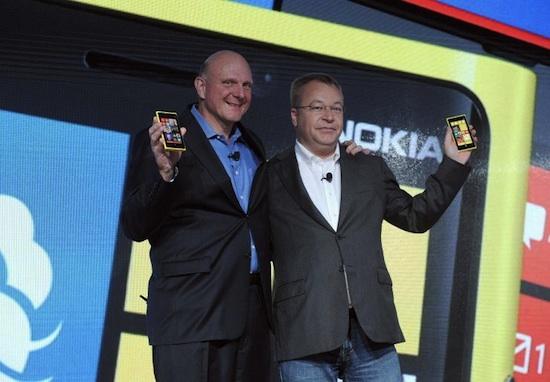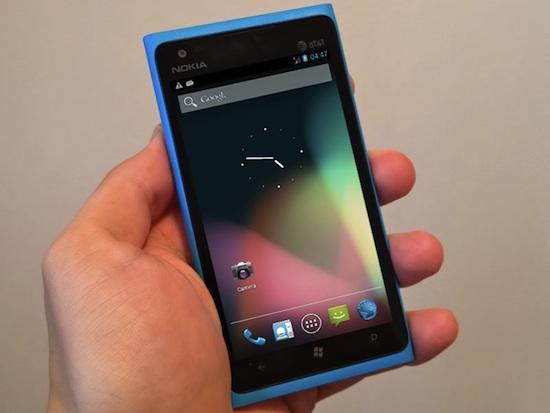
It's no secret that Finnish company Nokia is fully vested in Microsoft's Windows Phone venture, but just how much of their design is their credit is now being questioned by Microsoft.
Nokia has prided itself in design and simplicity in the face of increasingly detailed designs from competitors like Apple and HTC, a tactic that has helped Microsoft secure itself as the number three mobile operating system in the world. But in a recent interview of Nokia CEO Stephen Elop, he was asked about the future of their devices and what the new designs would be like. Elop was hesitant to admit much but was adamant that "we should be excited."
While Elop didn't get into too much detail, he was immediately overshadowed by Microsoft's Senior Marketing Manager Casey McGee on their influence over Nokia. "I am very happy with the relationship and the ability to influence what they are doing," referring to the hardware design of Nokia smartphones, said McGee.
This raises a few issues as to the relationship between Nokia and Microsoft. For starters, Nokia is their main distributor of Windows Phone devices. The fact that there is design influence is not surprising, but how much influence they have over Nokia is questionable. A few weeks ago, I wrote an editorial citing an SEC filing from Nokia claiming increased influence over Microsoft's role in Windows Phone. The SEC filing basically admitted that Nokia was concerned over Microsoft's likelihood that they could drop Nokia as a handset, and take the distribution of Windows Phone handsets in house. It would line up with the sporadic Microsoft Surface phone rumors that have been circling for a few years.
Pair the SEC filing with McGee's recent spilling of the beans and it seems that there could be some tension growing between the two companies.
According to ZDNet, Nokia received $250 million per quarter from Microsoft as a "platform support payment," which is a royalty to run Windows Phone on Nokia handsets. As compared to Nokia's total revenue in 2012, the Finnish company reported $40 billion, down 22 percent from 2011 ($51.6 billion). This was no doubt heavily influenced by Windows Phone's lack of traction in mobile.
In other words, less than a tenth of Nokia's revenue came from Microsoft's platform support payments. Nokia's smartphone business is also shipping half as many devices as compared to 2011, whereas non-smartphone shipments of 301 million are about on par with 2011's shipments. These devices do not run Microsoft's mobile operating system.
Having said this, Nokia's position seems to be a bit more one-sided than it looks from the outside. My perspective of Nokia smartphones has always gone hand in hand with Microsoft, but judging by McGee's quote on their influence of Nokia handset design, I'm beginning to think Nokia may be better off without them.
I'm curious what Nokia could come up with running a different mobile operating system. I have faith that it could be a competitive alternative to Apple's iPhone and Samsung's Galaxy S series.

My ideal Nokia handset was always synonymous with the Windows Phone operating system. I'd associate the hardware with the software, instead of the software with the hardware. From my perspective, Nokia looks like Windows Phone and since it's a clear number three in the mobile operating system arena, I'm beginning to think they're being held back by Microsoft's mobile OS.
If Nokia were to release the famed Lumia 928 running another OS, say Android with a user interface developed by Nokia, I fail to see how it would attract less attention than the same hardware running Microsoft's Windows Phone.
To top it off, I have always ranked HTC's Windows Phone 8X as the epitome of what hardware should accompany Microsoft's mobile OS, and I can't help but think Nokia is losing out to potential sales and revenue from Google's Android, and manufacturers like HTC who can deliver a solid Windows Phone experience, too.
In other words, it seems that Nokia handsets are playing it safe with the Windows Phone operating system because of Microsoft's dedication to the mobile space. Though they've had less than stellar market share and attention since their partnership, what you have to look at is growth and the mind share they've managed to acquire.
And in 2013, the end result seems less than stellar for either manufacturer.
I'm interested to hear your thoughts on Nokia and Microsoft's partnership this year. Do you think they work well together, or would you rather see Nokia hardware paired with a different operating system?
Images via DigitalTrends and TechnoBuffalo.
Update: We have been contacted by Microsoft's PR agency stating that the original context of the source of the article was "taken out of context in the original story." The exact wording is as follows: "Microsoft works closely with all Windows Phone manufacturers to deliver an innovative OS and a well-defined chassis specification so that customers and developers have a great experience across all devices. The hardware and design achievements that manufacturers such as Nokia add to the Windows Phone chassis specification are their own."